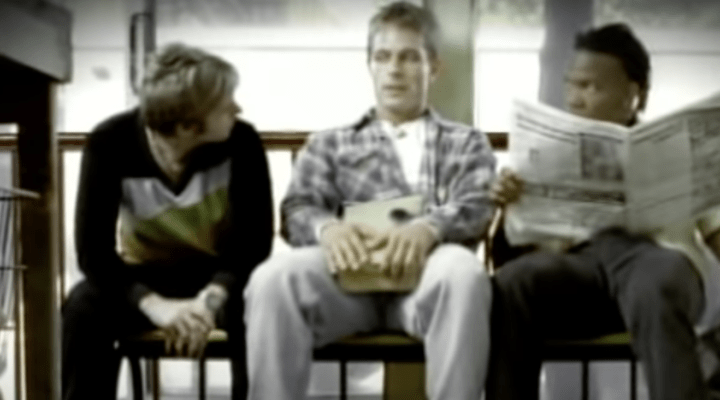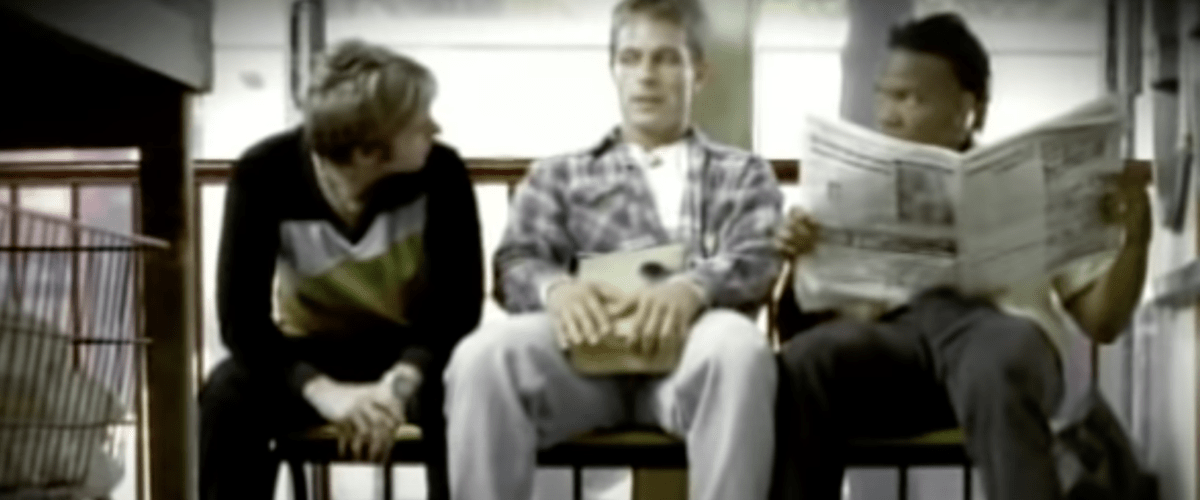I spent years, decades in fact, boiling in shame.
My scalding journey is well captured by one of the characters in DC Talk’s brilliant music video Just Between You and Me. I use this video in marriage and family classes to discuss forgiveness; in media literacy classes it wonderfully illustrates visual symbolism.
The video is set in a laundromat, a place where we literally do our laundry, and this becomes a symbol for doing our figurative “dirty laundry.” We get glimpses of a wide variety of people of different races and ages: a young woman in despair; an elderly man who looks wise and gentle; and a disheveled bag lady shown in a tattered photograph to have once been young and beautiful. In sum, the congregation in the laundromat symbolizes that everyone has dirty laundry.

Brad Bull
Meanwhile, there is a young man outside being chased by goons who are apparently after the small box he is clutching. This is the character who reminds me of me in my teens, 20s, 30s, 40s and the first few years of my 50s. The young man takes shelter in the laundromat. He’s drenched in sweat, clutching the mysterious box and looking side to side in paranoia and shame. Eventually, through some apparent realization or resignation, he rises to exit, and the apparently precious box is unceremoniously dropped in the trash can. This beautifully illustrates our tendency to cling to things that turn out to be not that important after all.
But that’s not the end of the video. The band members, also working on their laundry, retrieve the box from the trash can and start to open it. The video tantalizingly ends just before revealing the contents of the box.
What’s in the box?
I’ve seen students become apoplectic with disgust that the contents of the box are not revealed. Others smile and nod. Others are somber. As we discuss the video, when a frustrated student demands to know what was in the box, it’s usually a somber student who says something like, “It doesn’t matter what was in that guy’s box. What matters is thinking about what is in our boxes.” Or, “What do we carry that’s not necessary? What are we ashamed of that we should just drop in the trash can?” Or, “Maybe it’s just the shame that needs to be dropped in the trash.”

Screen capture from DC Talk music video
Ohhhh.
Now, guess what. When this essay ends, you won’t know what it was that was boiling me in shame — any more than we know the particular thorn in the Apostle Paul’s flesh. You might think you know, but you’ll probably be wrong (unless you were one of the handful of people to whom I finally opened up). So, why should you keep reading? Because you may still be carrying a shame box, or you certainly know someone who is. And this essay isn’t about my particular shame; it’s about what we all need to do to ditch our shame box. (I mean in addition to reading books by Brené Brown, John Bradshaw and Nadia Bolz-Weber.)
Across three decades, I had been to multiple therapists trying to shake the very thought of what I was ashamed about. I was like Family Secrets podcaster Dani Shapiro describing how she — raised Jewish — was racked with guilt when she ate a cheeseburger. I grew up Southern Baptist, so the list of taboos had grown longer than the book of Leviticus itself.
The therapists — from a psychiatrist to a pastoral counselor and every type in between — seemed to look at me with eyes that said, “What’s the big deal?” One explicitly said, “There’s lots of variety in the world. Some people like mustard; some people like mayonnaise.” Over and over it was like in the 2003 movie Luther when Martin Luther’s confessor Johann von Staupitz says, “You know, in two years I’ve never heard you confess anything remotely interesting.”
Wanting someone to tell me I was vile
Counselor after counselor, I wanted someone to tell me I was vile so that I would reach a transforming level of guilt. In seminary I dived into the subject. In a pastoral counseling class, I contracted to do a major paper for 100% of the grade. I chose to do a paper on delivering pastoral care to someone like me. The professor asked for a minimum of 20 pages; I wrote more than 40. The paper had close to 175 endnotes. Page for page, I put more blood and sweat into that paper than for my Ph.D. dissertation.
“I wanted someone to tell me I was vile so that I would reach a transforming level of guilt.”
But the exercise only took my torment to a higher level because the literature was completely mixed on whether the content of my box was inherently unhealthy or healthy. It was like when I was shopping for a camera. After one article I wanted a Nikon; after another I wanted a Canon. But in this case, my soul was torn. I wanted to be righteous. But, when there were so many opinions, how?
Meanwhile, in church history class, I wrote a long research paper on penance. My thesis was that Baptists had made grace cheap, and we needed to learn from traditions that give assignments to atone for sin. My conclusion stated that in the process of writing the paper, I had thought of a self-imposed penance that would make up for all my shameful thoughts and actions.
When I got the paper back, it had an “A” written on the cover, and I was elated. I must have convinced Bill Leonard that Baptists in general and I in particular needed to engage in acts of penance. But in the margin of the last page, Leonard annihilated my thesis and my self-imposed conclusion with one question: “When will it ever be enough?”
With just six words he both knocked down my thesis and gently told me I needed to take a hard look at my view of grace.
“With just six words he both knocked down my thesis and gently told me I needed to take a hard look at my view of grace.”
Still, I continued suffering for years. In utter torment. It was easier to believe that what was in my box was depraved than to question that my culture might be gaslighting me. Then one day I found birth into freedom in the strangest way — and with pain and mess akin to childbirth.
I was in my second or third session with a new counselor in a new city. Our sessions were in the early evening. I had decided not to waste time. I was just going to put all the cards on the table. Head down, I began confessing my inner-most shame. It was classic navel gazing. I literally was looking down in shame, unable to make eye contact with the pastoral counselor across from me.
I paused to gather my thoughts, and I heard something. It sounded like …
I looked up. My counselor was dead asleep. And snoring.
My silence woke him. He tried to pretend he had been listening. His eyes were heavy. He clearly was struggling to stay awake even after being caught sleeping on the job.
Anger shot through me. I had just bared my soul to someone I was paying, and he had fallen asleep at the wheel of my deepest shame.
As I drove away into the night, my angry foot was heavy on the accelerator. I got caught at a red light. I sat there fuming. Dude fell asleep while I was sharing my deepest shame! Then, the light turned, and a color-of-spring light poured through my mind and soul. Wait a second. Dude FELL ASLEEP while I was sharing my DEEPEST SHAME. I started quietly chuckling. As realization and release spread through my whole being, my chuckling crescendoed into belly laughing. My deepest shame wasn’t enough to keep someone awake. Ba ha ha! If it’s not enough to keep someone awake, maybe it really isn’t a big deal!
Shame draws attention away from what really needs to be fixed
C.S. Lewis’s classic work The Screwtape Letters portrays the trickiness of evil in our lives. What if one of the biggest tricks is getting us so obsessed with unnecessary guilt that it becomes shame?
“What if one of the biggest tricks is getting us so obsessed with unnecessary guilt that it becomes shame?”
Sociologist Brené Brown differentiates “guilt” from “shame.” She has said guilt is the sense that “I have done something bad,” while shame is the sense that “I am bad.” This is an important distinction. Appropriate guilt motivates us to better behavior. Shame, on the other hand, spirals us into deeper and deeper toxicity — often to the extreme of hopelessness and suicide.
Besides the extreme of abruptly ending our lives, distraction by unnecessary guilt sucks away the joy of our lives. One way it does this is by drawing away our attention from things that actually need to be fixed.
When I was in seminary, I started seeing a pastoral counselor in an effort to destroy what was in my box. This was the first of a series of counselors who left me dismayed with their lack of concern about what was in my box. But at least my effort to address the box led to serendipity. The discovery was triggered when the counselor asked me to bring to the next session a friend or family member who knew me well to give their perspective.
At one point the counselor said, “Brad, are you a perfectionist?” Simultaneously, I nodded yes, while my closest friend shook their head no. My friend said, “What do you mean you’re a perfectionist? You procrastinate about everything.” The counselor then pointed out that procrastination and perfectionism are not mutually exclusive. In fact, perfectionism feeds procrastination.
My counselor wrote a formula on a white board and asked me to solve for X. “Procrastination = perfectionism + [what?].” I shrugged. Then she did something that transformed my life. She completed the formula with searing but liberating words of truth.
“Procrastination = perfectionism + low self-esteem.” I nodded and said, “Yep. That’s me.” She then explained that procrastination is a defense mechanism. If I put off things to the last minute, when the product turned out less than perfect, I could blame it on how rushed I was. The imperfection of the product wasn’t because I was imperfect; it would have been better if I had just taken more time.
What had turned me into a raging perfectionist is another story. Suffice it to say, my counselor said, “We have to get your perfectionism down and your self-esteem up.” It would be years before I figured out what caused my perfectionism. We must be careful not to let not knowing how the fire started keep us from putting out the fire. However, if we can eventually find out the cause, it helps prevent flare ups.
A lesson in perfectionism
I resolved to conquer procrastination — an issue that my obsession about my box had caused me to ignore. The next week I chose to take on that major research paper as 100% of my grade. I was not going to procrastinate, and I was going to make an A+ on the paper, giving me an A+ in Introduction to Pastoral Care. Again, I never have worked harder on any single project.
I got the paper back. To have an A+ in the class I needed at least a 98. I opened the paper. It said 97.
I felt my body sink into abject despair. I rifled through the paper looking for the deductions. Around page 30 I found a paragraph with a bracket around it. The grader had written in the margin, “You could have fleshed this out a bit more. -2” My mind exploded. “What!? You asked for a 20-page paper. I gave you 42 meticulously supported pages, and you docked me two full points because I could have fleshed out one paragraph a little more?”
“A tear slid down my counselor’s cheek as she said, ‘Dear God. You are a perfectionist.’”
I was all for academic rigor. But two points for this vague criticism? However, minus 2 was still a 98 — an A+. Where was the other point? I thumbed through the paper two more times but couldn’t find it. Hallelujah! The grader had made a mistake. I would still have an A+ on my transcript for Introduction to Pastoral Counseling. But then I thought, “Wait a second. The reference list.” I started thumbing through the bibliography of 175 endnotes. Page after page were clean. Then it came. Somewhere around footnote 120, a typo was circled. In the margin there was a “-1.”
That night in my counselor’s office, I was slumped back in my chair. Empty. Elbow on armrest; cheekbone supporting my head on my fist. I told my counselor the story. I ended: “I have never worked harder, and I only made an A.” I looked up, eyes pleading for salvation. A tear slid down my counselor’s cheek as she said, “Dear God. You are a perfectionist.”
Carrying generations of boxes
It would be two to three years before the discovery of a generations-old family secret would help me start unraveling the origins of my perfectionism. It turned out I wasn’t just carrying my box. I was carrying other boxes that were unnecessary guilt: the unrepented legitimate guilt of others, and the shame of others over which I had no control.
And the boxes I was carrying and hiding were distracting me from things I actually could control. Namely, I did have control over lowering my perfectionism and increasing my self-esteem. What I thought was the problem was not my real problem. Shame was the real problem.
“What I thought was the problem was not my real problem. Shame was the real problem.”
Reading Daring Greatly and other books by Brené Brown helped in dealing with it, as did Healing the Shame That Binds You by John Bradshaw, and Shameless by Nadia Bolz-Weber. Ultimately, however, we have to make a choice to do something with what we read. And what helped me take action was finally having the courage to tell several trusted and healthy friends what was in my box and hearing them — to a person — say, “For the love of Pete. Is that what has been bothering you? Oh, for heaven’s sake.”
Of course, we must be careful who we talk to about the content of our boxes. A friend of mine once went to a deacon in her church to ask what he thought about what was in her box. The deacon told her she was possessed of demons. She nearly killed herself.
If we’re going to look in the mirror, we need one that is not distorted. We also have to remember that laundering shame is no quick chore, and when we ask for help we need to be careful about those who want to wash our colors in their bleach.
How two senior adult women saved my life
When I was in college and president of the Student Government Association and apparently making the world my oyster, I actually was in so much pain that I had made it as far as raising my dorm window and thinking seriously of jumping. (During a doctor visit I had lied and checked “no” on the intake form when asked if I ever contemplated suicide. My doctor was a community icon. There was no way I was telling him that I was regularly thinking of killing myself. It’s easy to say “no.” This is why I think it is better not to ask “if” someone is thinking of killing themselves but to say, “It’s very common for folks to think of hurting themselves. How often do you think about it?”)
Fortunately, I put my window down and drove to my grandmother’s house. She had been orphaned at age four when, in an argument over an unsweetened apple pie, her stepfather hit her mother with a chair. Her mother miscarried twins and bled to death. My grandmother then was raised by an uncle and aunt in an impoverished farm life. She married at 15, and by age 30 she was widowed with nine sons. She had a life that made Job’s life look like a cake walk. Her story put my problems in perspective, and I went back to college to face the fear I had fled — nearly by ending my life over a simple misunderstanding with a professor.
When I got to seminary, I missed my grandmother tremendously. I needed a grandmother. So, I found someone who needed a grandson. (A good rule for self-care is finding our mirror image.) I went to the local assisted living center and asked to visit someone who had little to no family.
“I was a dislocated young man in need of a grandmother, and she was a family-less woman in need of a grandson.”
Grace Ross was 96 years old and had Coke-bottle glasses that made her eyes as big as moons. We spent Sunday afternoons chatting in the cafeteria. One day, she was fidgeting with a salt shaker. She said, “My doctor won’t let me have salt because of my blood pressure.” I thought, “If I live to be 96, ain’t nobody gonna tell me what I can and can’t eat.” That turned out to be Grace’s exact attitude as well. She said, “I’ve just got a pepper shaker in my room.” She looked around to make sure we were alone, then leaned toward me and whispered, “But it doesn’t have pepper in it.” I belly laughed in soul-healing wonderment. “You go, girl!”
Grace gave me grace. I needed a mirror, and I found someone who needed one back. I was a dislocated young man in need of a grandmother, and she was a family-less woman in need of a grandson. We soothed each other.
A few years later, my own Mammaw Bull died — but not before telling me more stories of her rugged, lonely life. When I finished my Ph.D. in child and family studies, I went to her grave and laid at her tombstone two items: a copy of my diploma and a very sweet apple pie. I said to her, “Mammaw Bull, for every time I nearly gave up on a life where my worst day was better than your best day, I’m sorry. I pledge to live my life with your perseverance and joy.”
A major part of that pledge has been, like my Mammaw Bull did, learning how not to worry what others think about me. That was a shame-box that needed to be thrown in the trash — without procrastination. We all have sins for which we need to be cleansed. We also have social stigmas that are confused as sin. We must carefully discern between these and respond accordingly.
Now let us stand and sing Shall We Gather at the Laundry … and Trash Can.
Brad Bull is a private practice family therapist in Tennessee.
Related articles:
Let’s help evangelical Christians break free of the shame that drives them | Opinion by Eric Minton
Going public with Lent’s call to penitence | Opinion by Ken Sehested


